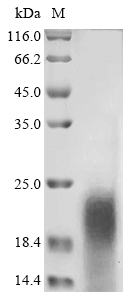Recombinant Macrovipera lebetina obtusa Disintegrin obtustatin
CAT:
399-CSB-YP306081VDJ-02
Size:
100 µg
Price:
Ask
- Availability: 24/48H Stock Items & 2 to 6 Weeks non Stock Items.
- Dry Ice Shipment: No




Recombinant Macrovipera lebetina obtusa Disintegrin obtustatin
- CAS Number: 9000-83-3
- UniProt: P83469
- Expression Region: 1-41aa
- Organism: Macrovipera lebetina obtusa (Levant blunt-nosed viper) (Vipera lebetina obtusa)
- Target Sequence: CTTGPCCRQCKLKPAGTTCWKTSLTSHYCTGKSCDCPLYPG
- Tag: C-terminal 6xHis-Myc-tagged
- Source: Yeast
- Field of Research: Others
- Assay Type: Developed Protein
- Relevance: Is a potent and selective inhibitor of alpha-1/beta-1 (ITGA1/ITGB1) integrin. It blocks the adhesion of alpha-1/beta-1-expressing K562 cells to immobilized collagens IV and I with IC (50) of 2 and 0.5 nM, respectively. Potently inhibits angiogenesis in chicken and in mouse model and reduces tumor development by half. Is 25-fold less potent than viperistatin.
- Purity: Greater than 85% as determined by SDS-PAGE.
- Activity: Not Test
- Length: Full Length
- Form: Liquid or Lyophilized powder
- Buffer: If the delivery form is liquid, the default storage buffer is Tris/PBS-based buffer, 5%-50% glycerol. If the delivery form is lyophilized powder, the buffer before lyophilization is Tris/PBS-based buffer, 6% Trehalose, pH 8.0.
- Reconstitution: We recommend that this vial be briefly centrifuged prior to opening to bring the contents to the bottom. Please reconstitute protein in deionized sterile water to a concentration of 0.1-1.0 mg/mL.We recommend to add 5-50% of glycerol (final concentration) and aliquot for long-term storage at -20℃/-80℃. Our default final concentration of glycerol is 50%. Customers could use it as reference.
- Molecular Weight: 8.1 kDa
- References & Citations: "Obtustatin: a potent selective inhibitor of alpha1beta1 integrin in vitro and angiogenesis in vivo." Marcinkiewicz C., Weinreb P.H., Calvete J.J., Kisiel D.G., Mousa S.A., Tuszynski G.P., Lobb R.R. Cancer Res. 63:2020-2023 (2003)
- Storage Conditions: The shelf life is related to many factors, storage state, buffer ingredients, storage temperature and the stability of the protein itself. Generally, the shelf life of liquid form is 6 months at -20℃/-80℃. The shelf life of lyophilized form is 12 months at -20℃/-80℃.
